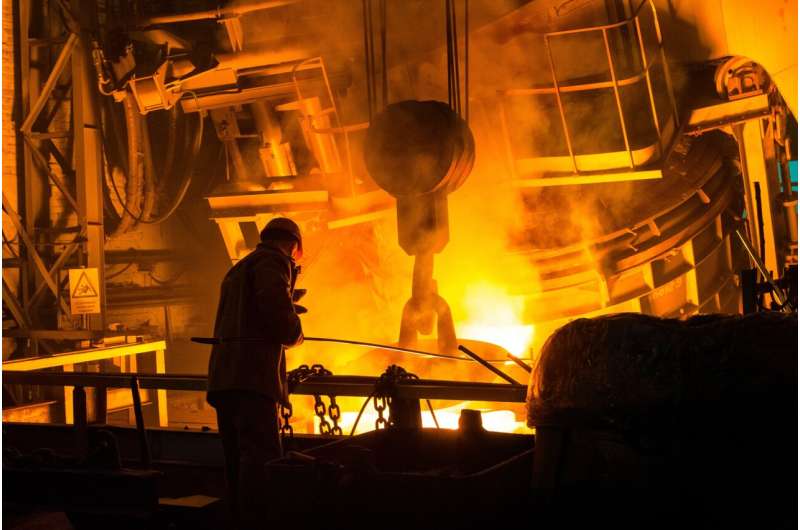This article has been reviewed according to Science X's editorial process and policies. Editors have highlighted the following attributes while ensuring the content's credibility:
fact-checked
trusted source
proofread
Asian cement and steel companies must decarbonize to survive carbon prices, says report

High carbon emitting businesses in Asia will see consistent negative profits if they fail to decarbonize.
This was the main conclusion of a new report published by the Center for Climate Finance & Investment at Imperial College Business School, together with the Singapore Green Finance Center.
The report, "Financial Implications of Carbon Pricing in the Asian Cement and Steel Industries," explores the financial impact of decarbonization on Asian cement and steel companies covered by selected Asian Emission Trading Schemes. The report aims to quantify the effect of carbon pricing systems on leading cement and steel producers, operating mainly in China and South Korea.
The report is published as carbon pricing is on the agenda at the COP28 climate summit. Carbon pricing, an instrument that captures the external costs of greenhouse gas emissions, is considered an essential climate mitigation policy tool.
Asia is the fastest-growing carbon trading market, with many countries within the region among the world's major emitters of greenhouse gases. The Asia Pacific region stands out as the most vulnerable region to climate change in the world. Yet, many countries in this area tread lightly when it comes to introducing carbon pricing schemes to promote decarbonization, as it is commonly believed that high carbon prices can impede the competitiveness of domestic industries.
The researchers of the new report conclude that the only way to reduce carbon price liability would be for these companies to decarbonize. However, the report also reveals that the funds needed for firms to fully decarbonize may exceed most companies' valuations.
Global carbon pricing is currently an average of $6 US dollars per ton. The consensus among experts is that carbon pricing must rise to $75–$150 US dollars by 2030, and potentially $100–$250 US dollars by 2050, to incentivize climate action. The issue of rising carbon prices has become a pressing concern for many organizations, particularly in the steel and cement industry.
Although the impact varies across firms, industries, and countries, the study finds that most cement and steel companies in the Asian region cannot survive rising carbon prices, with decarbonization being offered as the only solution.
Reflecting on the findings of the report, Dr. Anastasiya Ostrovnaya, lead author of the report and Senior Research and Teaching Fellow at the Center for Climate Finance & Investment, says, "This study highlights the urgent need for Asian steel and cement firms to decarbonize—if nothing else, for their own survival. But, as this report suggests, the capital needed for full decarbonization presents new challenges, prompting a debate on the capital structure and the state's role."
Antigoni Theocharidou, co-author and a Research Assistant at the Center for Climate Finance & Investment also says, "The implications of this paper extend beyond national borders and stress the need for better information and investors' education on the carbon pricing mechanisms in hard to abate sectors."
Looking ahead, the authors conclude that decarbonizing the Asian steel and cement sectors looks to be a daunting financial hurdle, particularly in the absence of subsidies.
They also stress the need for further research on second-order impacts, such as inflation and the redistribution of carbon pricing revenues, as well as the role of voluntary carbon markets in helping companies achieve their climate goals.
More information: Report: Financial Implications of Carbon Pricing in the Asian Cement and Steel Industries
















